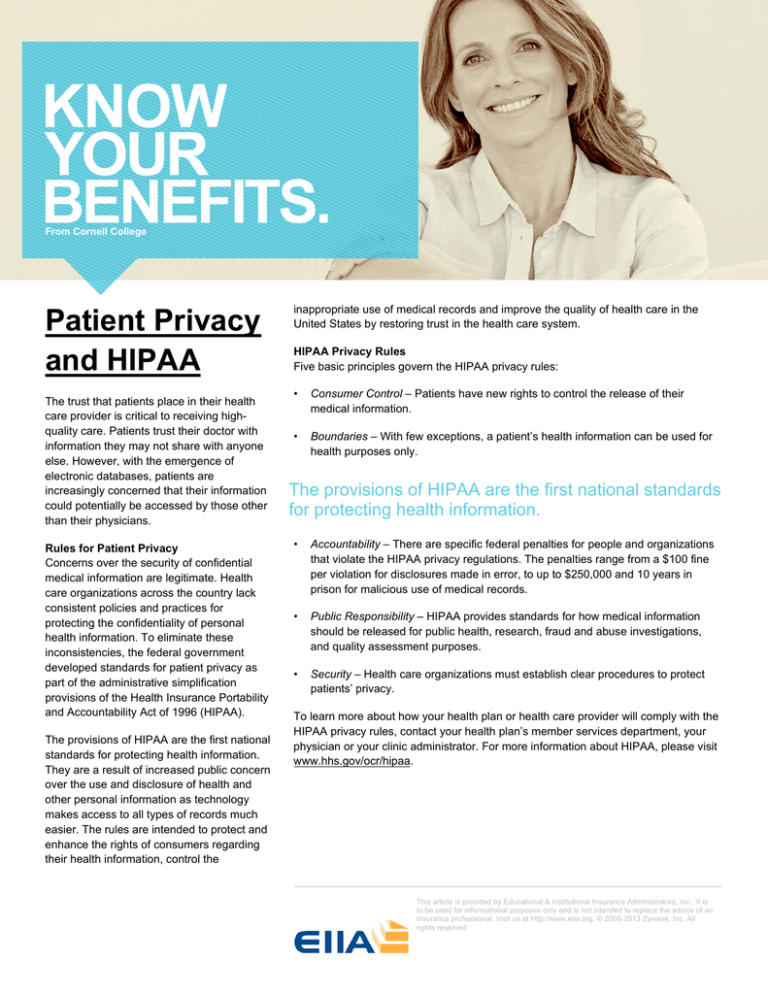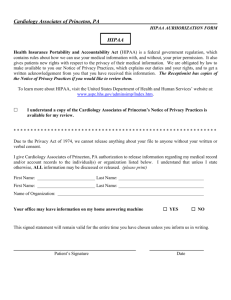
From Cornell College
Patient Privacy
and HIPAA
The trust that patients place in their health
care provider is critical to receiving highquality care. Patients trust their doctor with
information they may not share with anyone
else. However, with the emergence of
electronic databases, patients are
increasingly concerned that their information
could potentially be accessed by those other
than their physicians.
Rules for Patient Privacy
Concerns over the security of confidential
medical information are legitimate. Health
care organizations across the country lack
consistent policies and practices for
protecting the confidentiality of personal
health information. To eliminate these
inconsistencies, the federal government
developed standards for patient privacy as
part of the administrative simplification
provisions of the Health Insurance Portability
and Accountability Act of 1996 (HIPAA).
The provisions of HIPAA are the first national
standards for protecting health information.
They are a result of increased public concern
over the use and disclosure of health and
other personal information as technology
makes access to all types of records much
easier. The rules are intended to protect and
enhance the rights of consumers regarding
their health information, control the
inappropriate use of medical records and improve the quality of health care in the
United States by restoring trust in the health care system.
HIPAA Privacy Rules
Five basic principles govern the HIPAA privacy rules:
•
Consumer Control – Patients have new rights to control the release of their
medical information.
•
Boundaries – With few exceptions, a patient’s health information can be used for
health purposes only.
The provisions of HIPAA are the first national standards
for protecting health information.
•
Accountability – There are specific federal penalties for people and organizations
that violate the HIPAA privacy regulations. The penalties range from a $100 fine
per violation for disclosures made in error, to up to $250,000 and 10 years in
prison for malicious use of medical records.
•
Public Responsibility – HIPAA provides standards for how medical information
should be released for public health, research, fraud and abuse investigations,
and quality assessment purposes.
•
Security – Health care organizations must establish clear procedures to protect
patients’ privacy.
To learn more about how your health plan or health care provider will comply with the
HIPAA privacy rules, contact your health plan’s member services department, your
physician or your clinic administrator. For more information about HIPAA, please visit
www.hhs.gov/ocr/hipaa.
This article is provided by Educational & Institutional Insurance Administrators, Inc.. It is
to be used for informational purposes only and is not intended to replace the advice of an
insurance professional. Visit us at http://www.eiia.org. © 2008-2013 Zywave, Inc. All
rights reserved
From Cornell College
Women’s
Health and
Cancer Rights
Act (WHCRA)
of 1998
The benefits related to mastectomies
changed quite a bit with the Women’s Health
and Cancer Rights Act (WHCRA) of 1998.
This article will answer some of the common
questions patients have about the WHCRA.
What does WHCRA cover?
If you are enrolled in a health plan that
covers the medical and surgical costs of a
mastectomy, the WHCRA states that your
plan must also cover the costs of certain
reconstructive surgery and other postmastectomy benefits, including:
All stages of reconstruction of the
breast on which the mastectomy was
performed
Surgery and reconstruction of the
other breast to produce a symmetrical
appearance
External breast forms that fit into your
bra for before or during reconstruction
Treatment of any physical
complications of the mastectomy,
including lymphedema
I had a mastectomy due to non-cancer related health issues. Am I covered
under WHCRA?
Yes. These rights are not limited to cancer patients. If your plan covers mastectomies,
WHCRA rights apply.
My job does not offer a group health plan. Does WHCRA apply to my individual
health insurance policy?
Yes. WHCRA applies to group health plans that are provided by an employer or union
as well as to individual health insurance policies that are not based on employment.
Your health plan must also cover the costs of
certain reconstructive surgery and other postmastectomy benefits.
I receive health benefits through my church. Am I still covered under WHCRA?
There are certain “church” and “governmental” plans that are not subject to this law.
Generally, though, any plan that provides coverage for mastectomies must also
comply with WHCRA. Check with your provider for information specific to your plan.
Will my co-pay for reconstructive surgery be more expensive than my co-pay
for other health conditions?
No. If your health plan requires a co-payment for other health conditions, the co-pay
for your mastectomy benefits must be the same. For example, it is a violation of
WHCRA for your plan to cover 90 percent of hip replacement surgery but to only
cover 70 percent of breast reconstruction.
Is my health plan required to inform me of my rights under WHCRA?
Yes. Your health plan must provide you with a notice of your rights under WHCRA
when you first enroll in the health plan, and then annually after that.
This article is provided by Educational & Institutional Insurance Administrators, Inc.. It is
to be used for informational purposes only and is not intended to replace the advice of an
insurance professional. Visit us at http://www.eiia.org. © 2012, 2013 Zywave, Inc. All
rights reserved.



